Loughborough Lightning: The sporting franchise focused on women
- Published
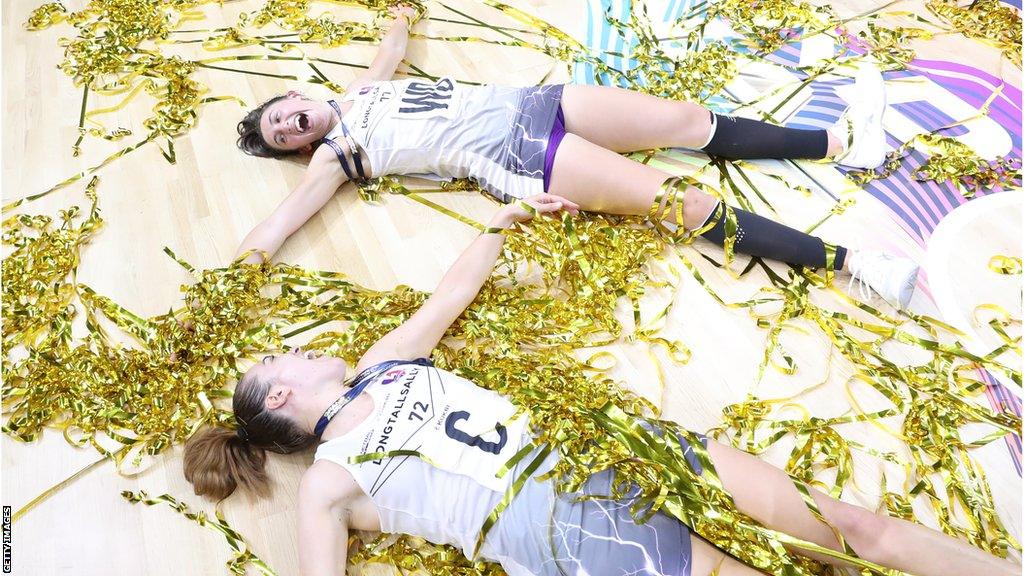
Loughborough Lightning are defending Netball Super League champions
It was on a university netball court in rural Leicestershire almost two decades ago that one of Britain's most ambitious and enduring ideas in women's sport was born.
For 19 years, Loughborough Lightning have been a netball force - having last season won a second Super League title - and the most prominent side in the stable of teams that compete in the upper echelons of rugby union, wheelchair basketball, football and cycling.
"Lightning is about women's sport, it offers a real brand for women's sport," Lightning's netball head coach Victoria Burgess told BBC Radio Leicester.
"It is really inspiring to know that it has been in place for 19 years, but also what has been created outside of it - wheelchair basketball, cycling, the football team, the rugby team, it's evolved into something special."
At a time of big growth in women's professional sport, Lightning remain unique and one of very few clubs that stand independent of a male brand.
BBC Sport takes a look at Lightning's origins at Loughborough University, why its founding idea remains important to this day and how it has evolved - resulting in its cricket side leaving for County Championship club Nottinghamshire and its rugby team partnering with men's Premiership outfit Northampton Saints.
'Specific focus on female sports'
Loughborough is a market town nestled in among Leicestershire farmland and situated just off the M1.
It is just about the middle of England, and is certainly at the epicentre of many sports - with the university serving as a hub for a number of British governing bodies, such as swimming, athletics, triathlon and weightlifting, as well as the England and Wales Cricket Board (ECB), and England Netball.
Even American football's NFL Academy has a home there.
Richard Wheater took over as Loughborough's director of sport in September, with his job including a focus on Lightning franchises, managing the multitude of sporting facilities and working with sporting and commercial partners.
He says Lightning has grown from being a netball team to become "a really good vehicle that people identify with female sport".
"It's not separate to Loughborough University, it is Loughborough University - it's a brand we put around teams," he said.
"Lightning is a way of putting a specific focus on female sport.
"One of the things I most enjoy is that we are a multi-sport environment. You have international netballers training next to Paralympians and Olympic swimmers. We believe that mixture of athletes and abilities adds a richness to the environment."
It is a medley of sports, personalities and athletes that also work closely with academics, sports scientists and researchers for the betterment of women in sport.
"As an industry we are learning all the time, we work closely with our academic colleagues to learn," Wheater said.
"We have a team working in sports bra technology, we have people looking at hormonal treatment, menstruation, fatigue - balancing female specific issues with the individual."
'Punching above financial weight'
The alignment of women's teams with established male sporting brands is commonplace - with engrained team loyalties and access to facilities and finances being among the benefits.
Bristol City were the last of the Women's Super League football clubs to be brought under a male club's umbrella, having previously reached the Champions League quarter-final as Bristol Academy.
Durham stand independently in the Women's Championship while London Bees now play in the third tier, having set out to blaze a trail for themselves in 2014.
With Loughborough University - which reported an annual turnover of almost £380m and surplus of £27m in their 2022-23 accounts -, external principally bankrolling the Lightning and housing all its teams, Wheater is confident when he says "we believe we punch above our weight in terms of financial investment".
"It's not a separate company, it's not a separate entity," he said.
"It's not piggy-backing on other things, it's a mutually re-enforcing thing. We are not state funded, we have plenty of ways of making money. We're university backed - and we have some additional revenue streams from sponsors."
Moving on to keep up
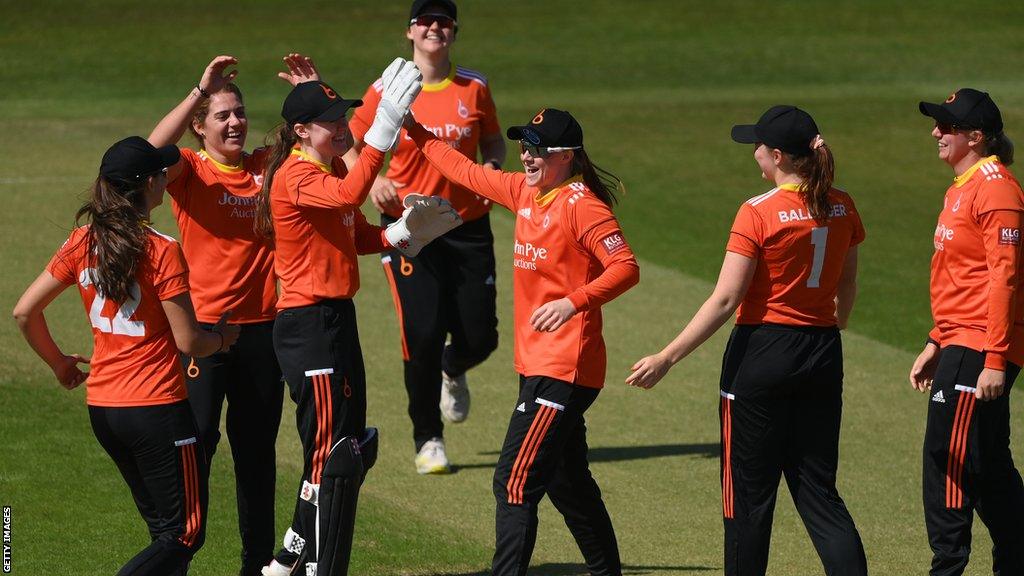
The Blaze were set up at Trent Bridge, home of Nottinghamshire County Cricket Club, last summer after the team left Loughborough Lightning's set up
It, however, was not enough to keep up with recent advancements in cricket.
Last summer the Lightning relinquished the team that plays in 50-over Rachael Heyhoe Flint Trophy and T20 Charlotte Edwards Cup. The franchise was moved north to Trent Bridge and rebranded as the Blaze.
Chris Guest, the Blaze head coach who was also in charge of the side at Lightning, said Loughborough's support and facilities suited "where the game" was previously.
"The university structures were fantastic, but the game probably has outgrown it," he said.
"So we are now hosted with a first-class county, which has moved us forward. The game was growing, and would have ended up costing the university money, and wouldn't have been able to keep up with other places financially.
"To move to Nottinghamshire, we have kept up with where regions are. Loughborough felt they were holding us back. It's certainly got a different feel, walking into a first-class cricket ground than a university.
"If we play a double header with a men's game, there will be more people to watch us. But we do play just as many games at Derbyshire or Leicestershire, and across the region, so our fanbase wouldn't just come from Notts."
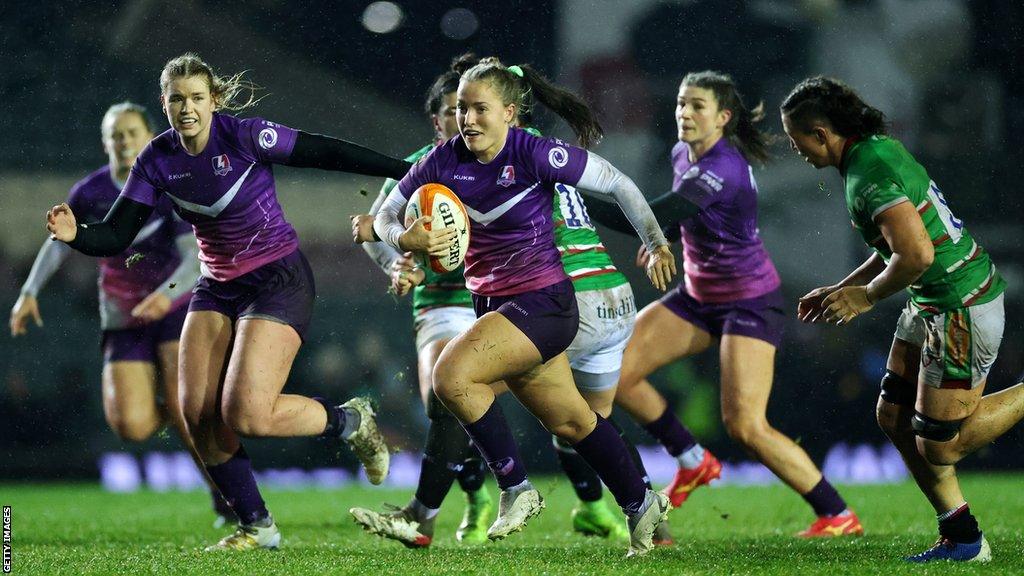
Loughborough Lightning have competed in the top flight of women's rugby in England since 2017
Lightning's Premiership Women's rugby union side have approached the next phase of their development differently, by linking up with Northampton Saints - a partnership that sees them play their home games at the 15,000 capacity cinch Stadium at Franklin's Gardens.
"Loughborough Lightning can do things Northampton Saints can't - and the same is true vice versa," Lightning's rugby head coach Nathan Smith said.
"We are in a better model because of it. We can use Franklin's Gardens, we don't have a stadium of that size and magnitude, or the history.
"Their experience of running a professional rugby union team is something we can learn a lot from.
"They bring players through their academy and people that can play for England. It's a similar situation here, we can put players through college, university and then up to the next level.
"This franchise has provided so much opportunity for women to excel in performance sport.
"Women have a platform in sport at Loughborough - whereas everywhere else it's men who get that platform."
'A massive step'
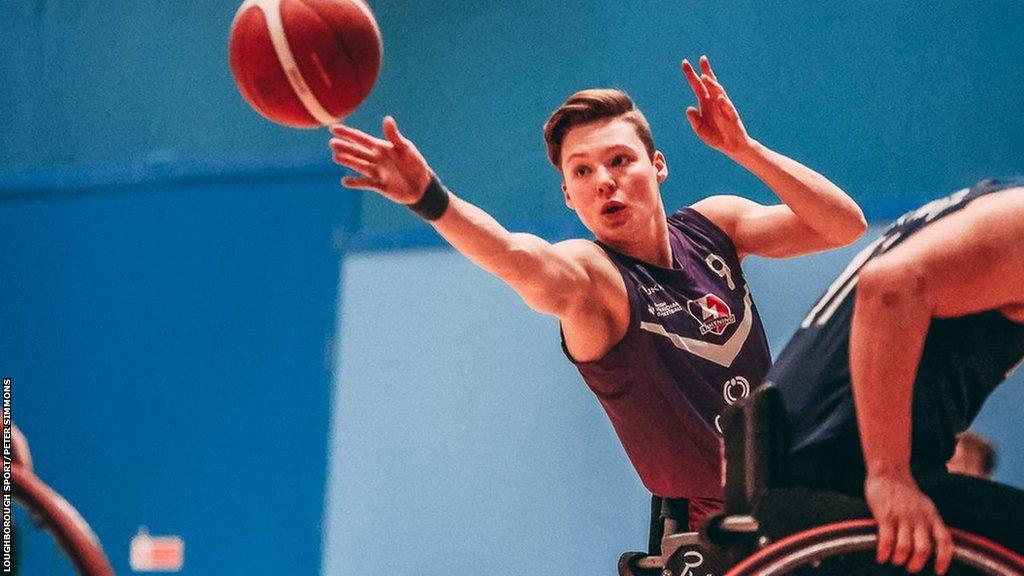
Dutch star Bo Kramer was Loughborough Lightning's headline international recruit in 2023
Still, the Lightning stable of sports has grown in recent years to include cycling and wheelchair basketball - a team that has lost just once across two title-winning campaigns in what is the first professional para-sport league in the world.
"Lightning is a prestigious brand in elite female sport, so for the university to want to make a wheelchair basketball team part of Loughborough Lighting is a massive step for our sport," head coach George Bates said.
"Our sport gets great coverage every four years because of the Paralympics, but this being live on TV sends it into the home of everyone that wants to watch it every year.
"Exposure is what sports need, and women's sport in general is also struggling with that, as is para-sport which is still a bit niche."
For Loughborough's cycling team, joining Lightning meant being spared having to stick to the "lanes of Leicestershire", and instead being able to challenge on a domestic level and aspire to compete on the world stage.
"Women's cycling is the growth area of world cycling, but we are growing while the sports grows," said team manager Dave Nichols.
"Ultimately, within the structures of the sport, the barriers to entry for women's cycling are lower but the ceiling is higher. The investment you can put in to women's sport will go further than men's.
"We have been able to grow the brand really quickly because of what has already existed.
"It's defined as is elite women's sport and it's instantly recognisable".
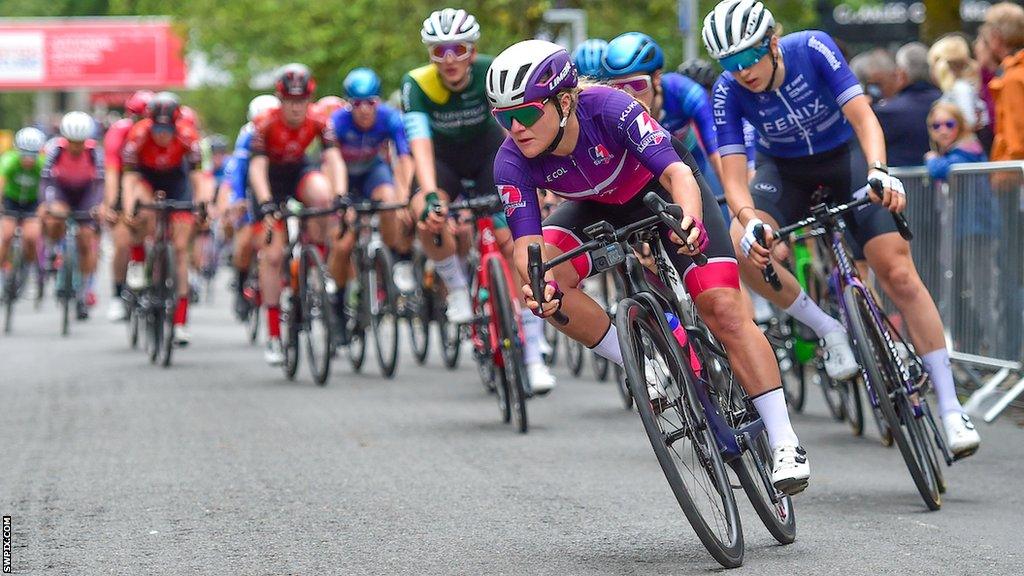
The Lightning Cycling franchise was set up at Loughborough in 2021